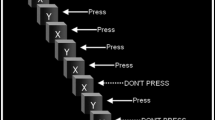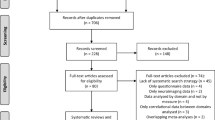Abstract
Rationale
A substantial literature indicates that in alcohol addiction aspects of impulsive decision-making are typical of individuals with an early onset of addictive behaviour problems. It is not known whether the same applies to opiate addiction, and this insight has important theoretical and clinical implications.
Objectives
This study aims to examine the relationship between age at onset of addictive behaviour problems and decision-making in opiate addiction.
Methods
Ninety-three opiate-dependent, treatment-seeking individuals were divided in three groups, early, late and intermediate onset of problems, and completed impulsivity questionnaires and delay discounting and gambling tasks.
Results
Individuals with a late onset of opiate problems (25 years or above) had lower delay discounting rates than individuals with early (18 years or less) or intermediate onset. There were no differences in performance on the gambling tasks. Late-onset individuals were older and had shorter drug histories, but there was no relationship between either age or length of exposure to opiates and delay discounting rates.
Conclusions
In keeping with previous studies in alcohol addiction, these findings support the notion of at least two distinct subgroups of opiate-dependent individuals, characterised by a different onset of problems, different propensity to impulsive behaviour and perhaps distinct mechanisms leading to addiction.

Similar content being viewed by others
References
Alfonso JP, Caracuela A, Delgado-Pastor LC, Verdejo-Garcia A (2011) Combined Goal Management Training and Mindfulness meditation improve executive functions and decision-making performance in abstinent polysubstance abusers. Drug Alcohol Depend 117(1):78–81
Audrain-McGovern J, Rodriguez D, Epstein LH, Cuevas J, Rodgers K, Wileyto EP (2009) Does delay discounting play an etiological role in smoking or is it a consequence of smoking? Drug Alcohol Depend 103:99–106
Bechara A, Damasio H (2002) Decision-making and addiction (part I): impaired activation of somatic states in substance dependent individuals when pondering decisions with negative future consequences. Neuropsychologia 40:1675–1689
Chick J, Aschauer H, Hornik K (2004) Efficacy of fluvoxamine in preventing relapse in alcohol dependence: a one-year, double-blind, placebo-controlled multicentre study with analysis by typology. Drug Alcohol Depend 74:61–70
Christakou A, Brammer M, Rubia K (2011) Maturation of limbic corticostriatal activation and connectivity associated with developmental changes in temporal discounting. NeuroImage 54(2):1344–1354
Clark L, Robbins TW, Ersche KD, Sahakian BJ (2006) Reflection impulsivity in current and former substance users. Biol Psychiatry 60:515–522
Cloninger CR (1987a) A systematic method for clinical description and classification of personality variants: a proposal. Arch Gen Psychiatry 44:573–588
Cloninger CR (1987b) Neurogenetic adaptive mechanisms in alcoholism. Science 236:410–416
Dom G, D'haene P, Hultijn W, Sabbe B (2006) Impulsivity in abstinent early- and late-onset alcoholics: differences in self-report measures and a discounting task. Addiction 101:50–59
Ersche KD, Fletcher PC, Lewis SJ, Clark L, Stocks-Gee G, London M, Deakin JB, Robbins TW, Sahakian BJ (2005) Abnormal frontal activations related to decision-making in current and former amphetamine and opiate dependent individuals. Psychopharmacology (Berl) 180(4):612–623
Everitt BJ, Belin D, Economidou D, Pelloux Y, Dalley JW, Robbins TW (2008) Neural mechanisms underlying the vulnerability to develop compulsive drug-seeking habits and addiction. Phil Trans R Soc B 363:3125–3135
Fillmore MT, Rush CR (2002) Impaired inhibitory control of behavior in chronic cocaine users. Drug Alcohol Depend 66(3):265–273
Fishbein DH, Krupitsky E, Flannery BA, Langevin DJ, Bobashev G, Verbitskaya E, Augustine CB, Bolla KI, Zvartau E, Schech B, Egorova V, Bushara N, Tsoy M (2007) Neurocognitive characterizations of Russian heroin addicts without a significant history of other drug use. Drug Alcohol Depend 90(1):25–38
Gerbing DW, Ahadi SA, Patton JH (1987) Toward a conceptualisation of impulsivity: conponents across the behavioural and self-report domains. Multivar Behav Res 22:357–379
Giordano LA, Bickel WK, Loewenstein G, Jacobs EA, Marsch L, Badger GJ (2002) Mild opioid deprivation increases the degree that opioid-dependent outpatients discount delayed heroin and money. Psychopharmacology 163:174–182
Howell DC (1997) Statistical methods for psychology, 4th edn. Duxbury Press, London
Irwin M, Schuckit M, Smith TL (1990) Clinical importance of age at onset in type 1 and type 2 primary alcoholics. Arch Gen Psychiatry 47(4):320–324
Johnson BA, Roache JD, Javors MA, DiClemente CC, Cloninger CR, Prihoda TJ, Bordnick PS, Ait-Daoud N, Hensler J (2000) Ondansetron for reduction of drinking among biologically predisposed alcoholic patients: a randomized controlled trial. JAMA 284:963–971
Kirby KN, Petry NM (2004) Heroin and cocaine abusers have higher discount rates for delayed rewards than alcoholics or non-drug-using controls. Addiction 99(4):461–471
Kirby KN, Petry NM, Bickel WK (1999) Heroin addicts have higher discount rates for delayed rewards than non-drug-using controls. J Exp Psychol Gen 128(1):78–87
Kranzler HR, Pierucci-Lagha A, Feinn R, Hernandez-Avila C (2003) Effects of ondansetron in early- versus late-onset alcoholics: a prospective, open-label study. Alcohol Clin Exp Res 27:1150–1155
Madden GJ, Petry NM, Badger GJ, Bickel WK (1997) Impulsive and self-control choices in opioid-dependent patients and non-drug using control participants: drug and monetary rewards. Exp Clin Psychopharmacol 5:256–263
Marsden J, Gossop M, Stewart D, Best D, Farrell M, Lehmann P, Edwards C, Strang J (1999) The Maudsley Addiction Profile (MAP): a brief instrument for assessing treatment outcome. Addiction 93(12):1857–1867
McClure SM, Laibson DI, Loewenstein G, Cohen JD (2004) Separate neural systems value immediate and delayed monetary rewards. Science 306:503–507
Moeller FG, Dougherty DM, Barratt ES, Schmitz JM, Swann AC, Grabowski J (2001) The impact of impulsivity on cocaine use and retention in treatment. J Subst Abuse Treat 21(4):193–198
Monterosso JR, Aron AR, Cordova X, Xu J, London ED (2005) Deficits in response inhibition associated with chronic methamphetamine abuse. Drug Alcohol Depend 79:273–277
Norman AL, Pulido C, Squeglia LM, Spadoni AD, Paulus MP, Tapert SF (2011) Neural activation during inhibition predicts initiation of substance misuse in adolescence. Drug Alcohol Depend 119:216–223
Odum AL, Madden GJ, Badger GJ, Bickel WK (2000) Needle sharing in opioid-dependent outpatients: psychological processes underlying risk. Drug Alcohol Depend 60:259–266
Passetti F, Clark L, Mehta MA, Joyce E, King M (2008) Neuropsychological predictors of clinical outcome in opiate addiction. Drug Alcohol Depend 94(1–3):82–91
Patkar AA, Murray HW, Mannelli P, Gottheil E, Weinstein SP, Vergare MJ (2004) Pre-treatment measures of impulsivity, aggression and sensation seeking are associated with treatment outcome for African-American cocaine-dependent patients. J Addict Dis 23(2):109–122
Patton JH, Stanford MS, Barratt ES (1995) Factor structure of the Barratt Impulsiveness Scale. J Clin Psychol 51:768–774
Reynolds B (2004) Do high rates of cigarette consumption increase delay discounting? A cross-sectional comparison of adolescent smokers and young-adult smokers and nonsmokers. Behav Process 67:545–549
Rogers RD, Everitt BJ, Baldacchino AM, Blackshaw AJ, Swainson R, Wynne K, Baker NB, Hunter J, Carthy T, Booker E, London M, Deakin JFW, Sahakian BJ, Robbins TW (1999) Dissociable deficits in the decision-making cognition of chronic amphetamine abusers, opiate abusers, patients with focal damage to prefrontal cortex, and tryptophan-depleted normal volunteers: evidence for monoaminergic mechanisms. Neuropsychopharmacol 20(4):322–339
Schmitz JM, Mooney ME, Moeller FG, Stotts AL, Green C, Grabowski J (2008) Levodopa pharmacotherapy for cocaine dependence: choosing the optimal behavioral therapy platform. Drug Alcohol Depend 94(1–3):142–150
Schmitz JM, Mooney ME, Green CE, Lane SD, Steinberg JL, Swann AC, Moeller FG (2009) Baseline neurocognitive profiles differentiate abstainers and non-abstainers in a cocaine clinical trial. J Addict Dis 28(3):250–257
Schneider S, Peters J, Bromberg U, Brassen S, Miedl SF, Banaschewski T et al (2012) Risk taking and the adolescent reward system: a potential common link to substance abuse. Am J Psych 169:39–46
Verdejo-Garcia AJ, Perales JC, Perez-Garcia M (2006) Cognitive impulsivity in cocaine and heroin polysubstance abusers. Addict Behav 32(5):950–966
Volkow ND, Li TK (2004) Drug addiction: the neurobiology of behaviour gone awry. Nat Rev Neurosci 5(12):963–970
Washio Y, Higgins ST, Heil SH, McKerchar TL, Badger GJ, Skelly JM, Dantona RL (2011) Delay discounting is associated with treatment response among cocaine-dependent outpatients. Exp Clin Psychopharmacol 19(3):243–248
Wechsler D (2001) Wechsler Test of Adult Reading (WTARuk). Adapted for UK use. The Psychological Corporation (Harcourt Assessment), London
Winstock AR, Strang J (2000) Opiates. In: Gelder MG, Lopez-Ibor JJ, Andreasen N (eds) The New Oxford Textbook of Psychiatry. Oxford University Press, Oxford, pp 523–531
Acknowledgments
The authors would like to thank Professors Kris Kirby and Antoine Bechara for supplying the Delay Discounting and Iowa Gambling Tasks.
Conflicts of interest
None. This work was supported by NoCLoR (North Central London Research consortium). F.P. was supported by University College, London and by St George’s Medical School, University of London.
Author information
Authors and Affiliations
Corresponding author
Rights and permissions
About this article
Cite this article
Passetti, F., Verdejo-Garcia, A. & Abou-Saleh, M. Comparatively preserved impulse control in late-onset opiate users. Psychopharmacology 230, 499–505 (2013). https://doi.org/10.1007/s00213-013-3174-x
Received:
Accepted:
Published:
Issue Date:
DOI: https://doi.org/10.1007/s00213-013-3174-x




